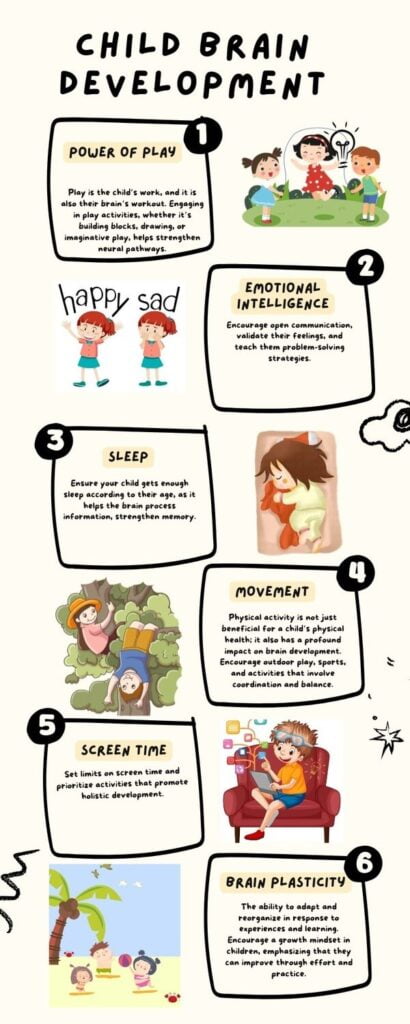Table of Contents
The human brain is an incredible marvel, but its true magic lies in the way it grows and evolves, especially during childhood. From the moment a child is born, their brain embarks on a remarkable journey of development that shapes their future. This journey is a unique and awe-inspiring process that we, as parents, caregivers, and educators, have the privilege to influence positively. In this post, we’ll explore the fascinating world of child brain development and ways to support and nurture it.
Building Blocks for the Child Brain Development
The human brain contains around 86 billion neurons, the fundamental building blocks of our cognitive abilities. During the early years of life, these neurons form connections, or synapses, at an astonishing rate. In fact, by the age of three, a child’s brain has already reached 80% of its adult size! This period of rapid brain growth presents a window of opportunity for learning and development that should not be underestimated.
Nature and Nurture
Child brain development is a harmonious interplay of genetics and environmental influences. While genetics provide the foundation, the child’s environment plays a pivotal role in shaping the brain’s structure and function. A loving, stimulating, and responsive environment is essential for optimal development. This includes exposure to language, interaction, and various sensory experiences.
The Power of Play
Play is the child’s work, and it is also their brain’s workout. Engaging in play activities, whether it’s building blocks, drawing, or imaginative play, helps strengthen neural pathways and develop crucial cognitive skills. Play fosters creativity, problem-solving, and social skills, making it an integral part of child development.
Language Development
Language is a cornerstone of cognitive development. From babbling to speaking in full sentences, a child’s language abilities undergo significant growth during their early years. Conversing with your child, reading together, and exposing them to a rich vocabulary can greatly enhance their language development, setting the stage for effective communication and literacy skills.

Emotional Intelligence
Childhood is a critical time for the development of emotional intelligence. Helping children understand and manage their emotions is essential. Encourage open communication, validate their feelings, and teach them problem-solving strategies. Emotional intelligence not only supports mental well-being but also enhances social relationships and empathy.
Nutrition and Brain Health
A healthy diet plays a substantial role in brain development. Nutrients like omega-3 fatty acids, antioxidants, and essential vitamins and minerals are crucial for brain health. Ensure your child’s diet includes a variety of fruits, vegetables, lean proteins, and whole grains to provide the nutrients their growing brain needs.
Sleep and Brain Restoration
Quality sleep is vital for consolidating learning and brain development. Ensure your child gets enough sleep according to their age, as it helps the brain process information, strengthen memory, and prepare for new challenges.
Sensory Stimulation
Children perceive and interact with the world primarily through their senses. Stimulating their senses through activities like touching different textures, listening to various sounds, and exploring different tastes and smells can enhance their sensory development. These experiences help the brain build a comprehensive understanding of the environment.
Cognitive Milestones
Childhood is marked by several cognitive milestones, such as object permanence, symbolic thinking, and abstract reasoning. These milestones represent significant leaps in a child’s intellectual development. Providing age-appropriate toys and activities that challenge their cognitive abilities can support them in reaching these milestones.
The Role of Movement
Physical activity is not just beneficial for a child’s physical health; it also has a profound impact on brain development. Active play and movement activities stimulate the release of neurochemicals that enhance mood, attention, and cognitive function. Encourage outdoor play, sports, and activities that involve coordination and balance.
Brain Plasticity
One of the most remarkable aspects of child brain development is its plasticity—the ability to adapt and reorganize in response to experiences and learning. This plasticity is at its peak during childhood, allowing the brain to recover from injury, adapt to new challenges, and acquire new skills. Encourage a growth mindset in children, emphasizing that they can improve through effort and practice.
Educational Environments
Preschool and early education settings play a crucial role in child brain development. High-quality early childhood education programs offer structured learning experiences that foster cognitive, social, and emotional growth. These environments provide opportunities for peer interactions, structured learning activities, and exposure to diverse ideas and concepts.

Technology and Screen Time
In the digital age, it’s important to be mindful of the role of technology and screen time in child brain development. While educational apps and programs can be beneficial when used appropriately, excessive screen time can interfere with other developmental activities like play, physical activity, and face-to-face interactions. Set limits on screen time and prioritize activities that promote holistic development.
Individual Differences
Every child is unique in their development, and there is no one-size-fits-all approach to nurturing their brains. Recognize and celebrate the individual strengths and interests of your child. Support them in pursuing their passions, whether it’s art, music, sports, or science, as these activities can further enrich their brain development.
Parenting and Caregiving
Parenting and caregiving play a central role in child brain development. Providing a secure and loving attachment, setting clear boundaries, and offering consistent guidance are essential for healthy development. Additionally, being attuned to your child’s needs and providing responsive care fosters a sense of trust and security, which is foundational for cognitive and emotional development.
Conclusion
Child brain development is a complex and beautiful journey that requires attention, care, and nurturing. Every child is unique, and their development unfolds at its own pace. By creating a supportive and enriching environment, fostering play, encouraging communication, and providing proper nutrition and sleep, we can contribute to the flourishing of their young minds. Remember, the future is in the hands of these developing brains, and the possibilities are boundless when we invest in their growth and potential.
